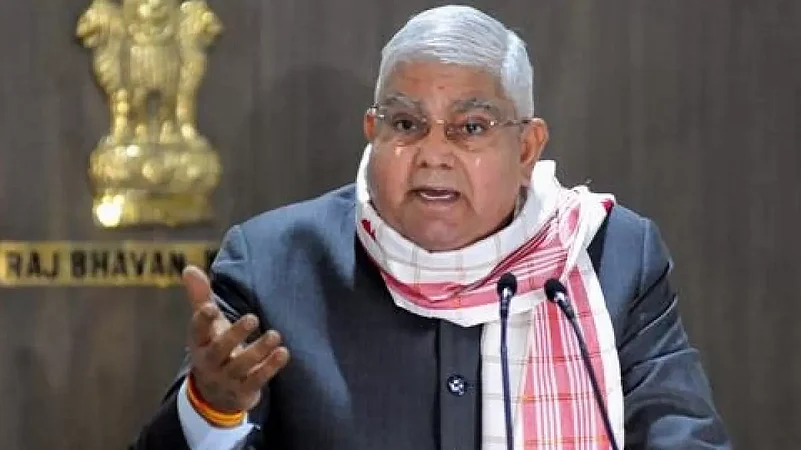The ISRO has launched 424 foreign satellites, half of them for the United States, Rajya Sabha Chairman Jagdeep Dhankhar said Wednesday calling the space agency's journey so far extraordinary.
Speaking at the start of the discussion in the House on 'India's glorious space journey marked by successful soft landing of Chandrayaan-3', he said what sets the ISRO apart is its ability to achieve remarkable feats at a fraction of the cost compared to some of the world's other major space agencies such as the NASA and the European Space Agency (ESA).
"Emphasis on indigenization of critical components and reducing reliance on imports has been a critical aspect of its cost-effective approach and has indeed sparked discussions within the international space community," he said.
India's journey in space exploration is indeed a matter of national pride, he said.
"From the inception of our space programme, we have consistently pushed the boundaries of space exploration and our achievements in this domain," he said.
"These have catapulted the nation onto the global centerstage. From Chandrayaan missions to the Moon, Mars Orbiter Mission (Mangalyaan) and Aditya Ll solar exploration, India has shown that the sky is not the limit; it's just the beginning," he said.
He said that over six decades, India's space programme has seen the country evolve from a nation relying on foreign launch vehicles to becoming fully self-reliant with indigenous launch capabilities.
"Notably, India has not only developed the capacity to launch its own satellites but has also extended its services to launch satellites for other countries," he said.
From January 2018 to November 2022, the ISRO successfully launched 177 foreign satellites. "So far, we have launched 424 foreign satellites of which more than 90 per cent (389) were launched in the last nine years."
The USA (231), the UK (86) and Singapore (20) are the top three beneficiaries of India's international cooperation in this sector, he said.
With the latest successful mission Chandrayaan-3, India's space agency ISRO has etched its name in the annals of space exploration, he said, adding India is only the fourth country in history to have soft-landed a spacecraft on the Moon and the first to have done so in the moon's South Polar region.
"Exhibiting tremendous tenacity and turning failures into stepping stones for future success, the ISRO took away the right lessons from the preceding Chandrayaan 2 mission," he said.
With this achievement, India is now a member of the Artemis Accords, the US-led multilateral initiative to place humans on the Moon by 2025 and subsequently advance human space exploration throughout the solar system's broader vicinity, he said.
"Our achievements reach beyond the lunar surface. India's Mars Orbiter Mission, unofficially known as Mangalyaan, showcased our ability to reach the Red Planet on our maiden attempt.
"The Mangalyaan spacecraft successfully entered Mars orbit on September 23, 2014, making ISRO only the first Asian and the fourth country in the world to do so and it achieved this feat with unparalleled cost-effectiveness," he said.
After Chandrayaan-3 mission, ISRO has launched a mission to seek deeper understanding of the Sun from a unique vantage point approximately 1.5 million kilometers away from Earth that allows for continuous and uninterrupted study of the Sun, he said.
"With this mission, India is poised to join an exclusive group of countries dedicated to the study of our nearest star, the Sun," he said.
The ISRO, he said, has an array of exciting future endeavours and has now set its sight on the second most scorching planet in solar system, Venus. ISRO's upcoming spacecraft Shukrayaan-1 will likely be launched by the end of December 2024.
"With three more launches on the horizon, spanning this year and the next, ISRO is positioned to advance Earth monitoring, demonstrate advanced capabilities for precision proximity operations in space and explore some of the most enigmatic objects in the universe," he said.
-With PTI Input


























